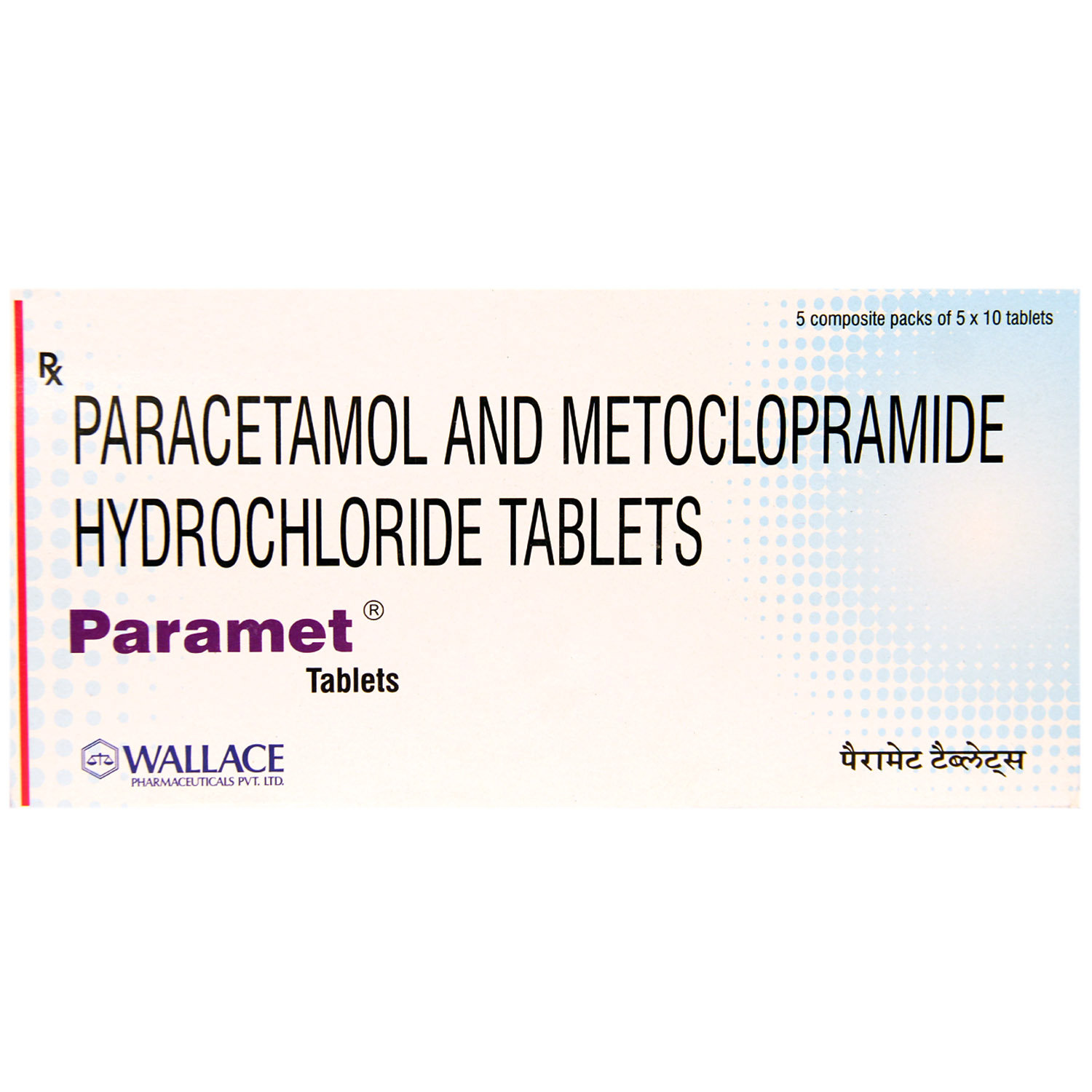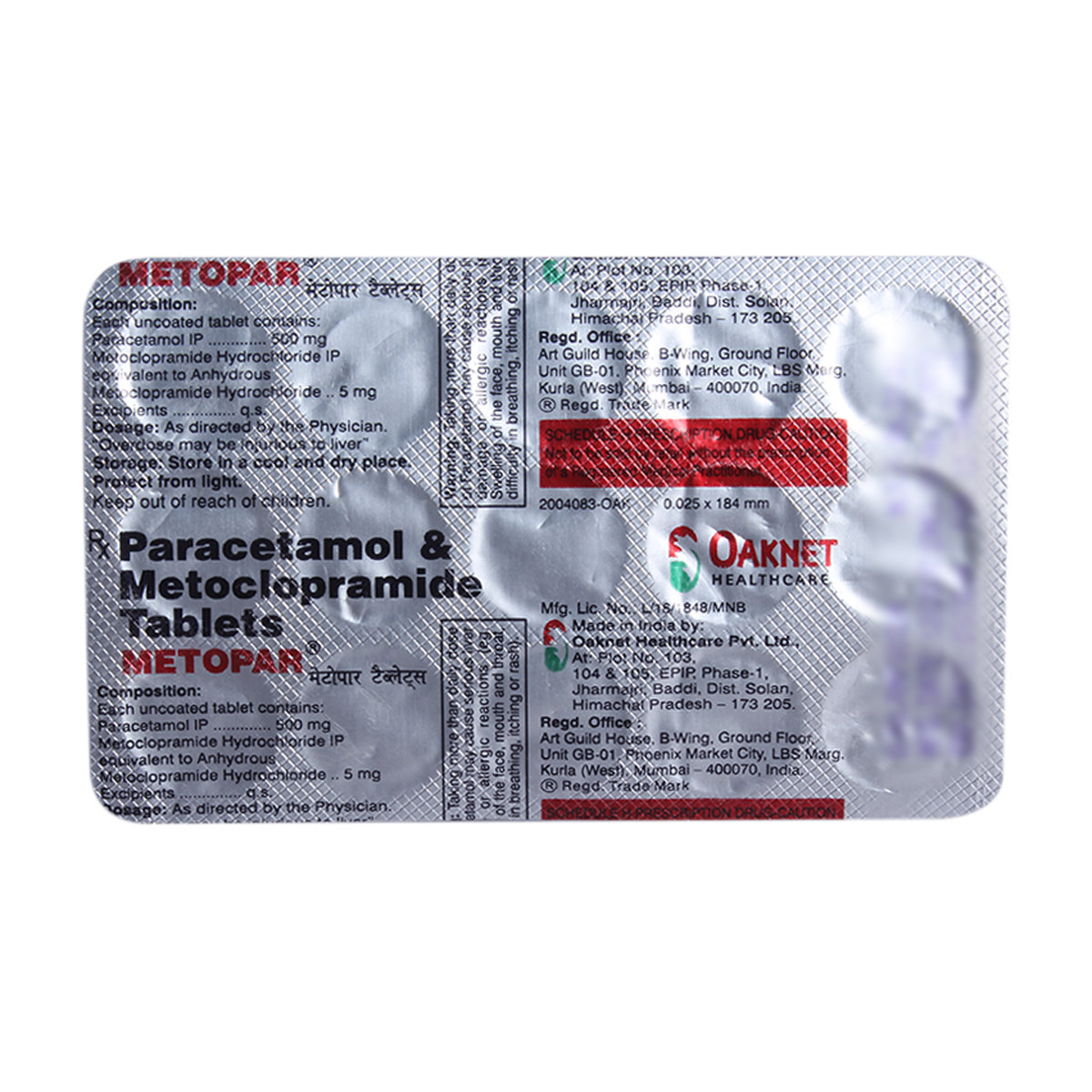Metoclopramide+paracetamol
About Metoclopramide+paracetamol
Metoclopramide+paracetamol belongs to the group of medicines called anti-migraine agents used to treat signs of migraine such as headache, being sick (vomiting), and feeling sick (nausea). Migraine is a neurological condition which is characterised by an intense pulsating, throbbing, pounding, debilitating headache which generally occurs on one side of the head; however, it can occur on both sides or shift.
Metoclopramide+paracetamol is a combination of two drugs: Metoclopramide (anti-emetics) and Paracetamol (analgesics). Metoclopramide works on the part of the brain and prevents the symptoms of nausea and vomiting. It also works on the muscles in the upper part of the digestive system, this helps in emptying the stomach. Paracetamol works by blocking the effect of a chemical messenger known as prostaglandins which cause pain. Together Metoclopramide+paracetamol helps in relieving the symptoms of migraine.
Take Metoclopramide+paracetamol as prescribed. You are advised to take Metoclopramide+paracetamol for as long as your doctor has prescribed it for you depending on your medical condition. In some cases, you may experience certain common side-effects such as dizziness, sleepiness, diarrhoea, irregular periods, weakness, nervousness and breast enlargement in men. Most of these side-effects do not require medical attention and will resolve gradually over time. However, you are advised to talk to your doctor if you experience these side-effects persistently.
Consult your doctor before taking Metoclopramide+paracetamol if you are pregnant or breastfeeding. Metoclopramide+paracetamol should not be taken during the first 6 months of pregnancy. Metoclopramide+paracetamol may cause drowsiness and sleepiness, so drive with caution. Metoclopramide+paracetamol is not recommended for children below 18 years as safety and efficacy have not been established. Avoid consuming alcohol with Metoclopramide+paracetamol as it could lead to increased drowsiness and sleepiness. Inform your doctor about your health condition and medicines you are taking to rule out unpleasant side-effects.
Uses of Metoclopramide+paracetamol
Medicinal Benefits
Metoclopramide+paracetamol is a combination of two drugs, namely: Metoclopramide and Paracetamol. Metoclopramide+paracetamol is used to treat migraine signs such as headache, being sick (vomiting) and feeling sick (nausea). Metoclopramide is an anti-emetic that works on the part of the brain, thereby prevents the symptoms of nausea and vomiting. It also works on the muscles in the upper part of the digestive system, this helps in the emptying of the stomach. Paracetamol is an analgesic that works by blocking the effect of a chemical messenger known as prostaglandins which cause pain. Thereby, helps in relieving pain. Together Metoclopramide+paracetamol helps relieve the symptoms of migraine such as headache, nausea and vomiting.
Directions for Use
Storage
Side Effects of Metoclopramide+paracetamol
- Dizziness
- Sleepiness
- Diarrhoea
- Irregular periods
- Weakness
- Nervousness
- Breast enlargement in men
Drug Warnings
Do not take Metoclopramide+paracetamol if you are allergic to any of its contents; if you have/had blockage or bleeding in your stomach, epilepsy/fits, phaeochromocytoma (tumour of the adrenal gland), uncontrollable movements of the face, arms or legs after taking metoclopramide or medicines used to calm mental problems, if you had an operation on stomach or intestine or if you are taking levodopa. Inform your doctor before taking Metoclopramide+paracetamol if you have/had severe kidney or liver problems; if you are 65 years or older. Consult your doctor if you are pregnant or breastfeeding. Metoclopramide+paracetamol should not be taken during the first 6 months of pregnancy. Metoclopramide+paracetamol may cause sleepiness and dizziness, so drive only if you are alert. Metoclopramide+paracetamol is not recommended for children below 18 years as safety and effectiveness have not been established. Avoid consuming alcohol with Metoclopramide+paracetamol as it could lead to increased sleepiness. Metoclopramide+paracetamol contains paracetamol, do not take any other medicines containing paracetamol along with Metoclopramide+paracetamol unless prescribed.
Drug Interactions
Drug-Drug Interactions: Metoclopramide+paracetamol may interact with anti-Parkinson (levodopa), anti-depressants (mirtazapine, trazodone), antibiotic (chloramphenicol), blood thinner (warfarin), immunosuppressant (cyclosporine), anti-hypertensive (clonidine), pain killers (codeine, dihydrocodeine, dextropropoxyphene), anti-histamines (chlorphenamine, promethazine), cardiac glycoside (digoxin), anti-emetic (domperidone), bile acid sequestrants (cholestyramine), anti-cholinergic (mebeverine, hyoscine, oxybutynin, propiverine, tolterodine), antipsychotics, hypnotics, and anxiolytics.
Drug-Food Interactions: No interactions found/established.
Drug-Disease Interactions: Inform your doctor if you have blockage or bleeding in your stomach, epilepsy/fits, phaeochromocytoma (tumour of the adrenal gland), uncontrollable movements, severe kidney or liver problems.
Drug-Drug Interactions Checker List:
Safety Advice

Alcohol
unsafeAvoid consumption of alcohol while taking Metoclopramide+paracetamol as it may cause increased sleepiness.

Pregnancy
unsafeMetoclopramide+paracetamol should not be taken during the first 6 months of pregnancy. Please consult your doctor before taking Metoclopramide+paracetamol if you are pregnant or planning for pregnancy.

Breast Feeding
cautionMetoclopramide+paracetamol may pass into breastmilk. Please consult your doctor before taking Metoclopramide+paracetamol if you are breastfeeding.

Driving
cautionMetoclopramide+paracetamol may cause dizziness and sleepiness. Do not drive or operate machinery unless you are alert.

Liver
cautionDose adjustment may be needed in patients with liver impairment. Please consult your doctor if you have a liver impairment or any concerns regarding this.

Kidney
cautionDose adjustment may be needed in patients with kidney impairment. Please consult your doctor if you have kidney impairment or any concerns regarding this.

Children
unsafeMetoclopramide+paracetamol is not recommended for children below 18years as the safety and effectiveness were not established.
Habit Forming
Diet & Lifestyle Advise
- Maintain a healthy diet and exercise regularly as it helps in improving overall health and boosts self-esteem.
- Avoid bright lights, loud noise, and extreme temperatures.
- Perform meditation and yoga. This helps in relieving stress and provides relaxation.
- Follow a regular sleep pattern to improve the amount and quality of sleep you get.
- Massage your scalp to ease the pain.
- Lie down in a quiet, dark room.
- Place a cold cloth over your forehead or neck.
- Avoid smoking, alcohol, and caffeinated drinks.
- Learn what triggers your migraine and try avoiding them.
- Stay hydrated. Drink plenty of fluids.
- Learn relaxation skills as they help in reducing stress.
Special Advise
Metoclopramide in Metoclopramide+paracetamol may decreases the gastric absorption of digoxin. Therefore, inform your doctor if you take digoxin.
Patients Concern
Disease/Condition Glossary
Migraine: Migraine is a neurological condition which is characterised by an intense, debilitating headache. Hormonal changes, stress, lack or excess of sleep, bright lights, loud sounds, certain foods and drinks can trigger migraine headaches. Warning symptoms precede migraine headache one or two days before the headache itself. The warning symptoms include food cravings, depression, fatigue, hyperactivity, irritability and neck stiffness. Symptoms of migraine include throbbing pain in one particular area with varying intensity, nausea, vomiting, numbness or tingling sensation, difficulty speaking, sensitivity to sound and light.
FAQs
Metoclopramide+paracetamol contains Metoclopramide and Paracetamol. Metoclopramide works on the part of the brain, thereby prevents the symptoms of nausea and vomiting. It also works on the muscles in the upper part of the digestive system, this helps in emptying the stomach. Paracetamol works by blocking the effect of a chemical messenger known as prostaglandins which cause pain. Thereby, helps in relieving pain.
Consult your doctor before taking oral contraceptive pills along with Metoclopramide+paracetamol as they might decrease the effectiveness of Metoclopramide+paracetamol. Talk to your doctor, he/she may advise you to use an alternate method of contraception.
Metoclopramide+paracetamol contains Paracetamol, an analgesic used to provide relief from pain. Therefore, please consult your doctor before taking any pain killer medicines, fever-reducing medicines, medicines for cold or sleeping problems along with Metoclopramide+paracetamol as they may also contain paracetamol.
If you had an operation on your stomach or intestine, do not take Metoclopramide+paracetamol during the first 3-4days after the surgery. However, please talk to your doctor before taking Metoclopramide+paracetamol if you have had surgery.
Diarrhoea could be a side-effect of Metoclopramide+paracetamol. Drink plenty of liquids to replace the lost fluids if you experience diarrhoea. Consult your doctor if the condition persists or worsens.
Metoclopramide+paracetamol may cause irregular periods or loss of periods. Please consult your doctor if you experience this for longer than a few days.





